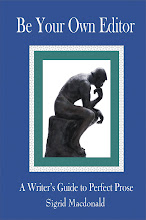Now that we are more evolved, we realize that there
are all kinds of terms that we may have grown up with that aren't really
appropriate in a writer's vocabulary. Anything that sounds even remotely
derogatory about gays is something that you want to avoid unless you are
deliberately portraying a character in a novel as being homophobic.
Likewise with sexist terminology. If you are talking
about a 53-year-old, it's best not to refer to her as a girl or a lady. Woman
is the preferred term.
The word retarded has been in the news lately thanks
to Ann Coulter making a big splash calling President Obama "a retard," and it's
not the president who took offense! It was the disabled community, particularly
those with Down's Syndrome. No doubt Coulter did not intentionally try to
disparage anyone with Down's Syndrome; however, her choice of words was
unfortunate. If you know anything at all about Coulter, you will know that she
didn't care, but I'm sure that you do.
Because it's not just about being politically correct.
It's about being sensitive, thoughtful, and kind. So when you finish writing
your blog piece, your article, or your manuscript, ask yourself if any of your
hidden prejudices or words that you have used all your life that you never thought
of as being anti-Semitic, ageist, or whatever, could hurt somebody else's
feelings. And then go back and remove them.
Sigrid
Macdonald is the author of three books, including Be Your Own Editor http://tinyurl.com/7wnk5se and two erotic
short stories, which she wrote under the pen name Tiffanie Good. Silver
Publishing just released "The Pink Triangle," a tale of friendship,
lust, and betrayal. You can view her story here: http://tinyurl.com/6v65rgr


